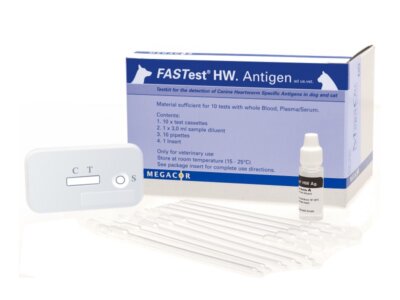
Heartworm (Dirofilaria immitis) is a seriously debilitating disease of dogs throughout southern Europe, Southeast Asia, the Middle East and South America. Though not yet established in the UK, climate changes and the presence of mosquitoes capable of transmitting the parasite highlights the benefits a simple and reliable D.immitis diagnostic test with real-world practicality.
What Is Dog Heartworm?
Heartworm, or Dirofilaria immitis, is a thread-like parasitic worm that infects the heart, lungs and blood vessels of wild and domestic dog species as well as ferrets, bears, seals, sea lions and, more rarely, cats and humans. Heartworms form a congestive mass in the heart of an infected animal severely restricted the circulation of blood through the lungs and around the body.
Dogs suffering from heartworm infestation can show symptoms including weight loss or anorexia, a soft but persistent cough, lethargy or a reluctance to exercise, rapid or difficult breathing, decreased appetite, swelling around the chest or abdomen and – in the worst cases – sudden collapse and even death.
Changing-up: The Risk of Heartworm In The UK
Heartworm is a ‘vector-borne’ parasite transmitted by the bite of infected mosquitoes. Immature D.immitis larvae are injected, by mosquito bite, into the bloodstream of a domestic or wild population dog. With hundreds of others, they grow into adult heartworm forming a tangled, congestive mass in the dog’s blood vessels, organs and heart. Mating, they produce more larvae which are taken up by a feeding mosquito to continue the cycle of infection.
Vector-borne diseases require a ‘perfect triangle’ of hosts, vectors and a transmissible parasite. The UK already has a population of dog hosts and the mosquitoes capable of carrying the infective larvae, though a cool climate keeps the mosquito population low. Increased foreign travel under the Pet Travel Scheme (PETS), together with illegal dog imports heightens the risk of dogs arriving in the UK with a D.immitis infection. Climate change is likely to increase the numbers, lifespan and spread of the home mosquito population.
Early Detection of Heartworm Is The Key To The Cure
Dogs suffering from heartworm can be treated with a combined regime of medication and rest. Some degree of preventative treatment may also be available for dogs travelling to areas where D.immitis infection is more common. Your veterinary surgeon will be able to advise on the best course of action for you and your dog.
Where infection by, or exposure to, heartworm-carrying mosquitoes is suspected an immediate visit to your vet is essential. Vets and veterinary laboratories are equipped to carry out a range of procedures, including X-ray, ultrasound, ECG and highly specific veterinary diagnostic tests to detect clinical and early-stage signs of heartworm infection.
FASTest Heartworm Ag is a simple, 15-minute test for detecting specific Dirofilaria immitis markers (antigens) in whole blood, plasma or serum from dogs thought to have been exposed to infected mosquitoes. Test data shows the clear, colour-change test to be 98.6 % sensitive and 99.1% specific. Storage at room temperature (15-25° C) and long shelf life makes the all-in-one test kit a practical and economical veterinary field and laboratory diagnostic test.
Visit our website to see our full range of Veterinary Products www.vetlabsupplies.co.uk or contact us on 01798 874567.

